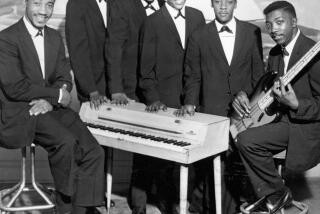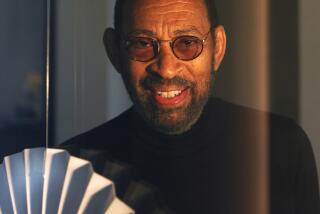T. McMichael; Last of the Merry Macs Founders
- Share via
Ted McMichael, the last of the founding brothers of the Merry Macs who pioneered four-part vocal harmony and were the first to include a female in that harmonic quartet, has died. He was 92.
McMichael, whose group had such 1940s pop hits as “Mairzy Doats” and “Sentimental Journey,” died Feb. 27 in Camarillo, said his niece, Nelda McMichael Gruenthal.
Ted as the baritone, and brothers Judd and Joe singing tenor, began singing together as teenagers in Minneapolis in the early 1920s--sometimes adding their mother to sing the melody.
Heard by organist Eddie Dunsteder, they were hired to sing on his WCCO radio show in their hometown. He named them the Mystery Trio and ironically, though radio listeners couldn’t see them, had them wear masks.
Then along came bandleader Joe Haymes, who renamed them the Personality Boys and took them on the road. It was the Haymes band that inspired their four-part harmony, a radical departure from the then-popular barbershop quartet style, or a trio of voices with the fourth harmony part played by an instrument.
“The saxophones played it, two trumpets and two trombones played it, and we decided to try it vocally,” McMichael said not long ago.
Changing their name to the Merry Macs, the brothers hired Cheri McKay, the first of four women who would sing melody on the group’s records. The others were Helen Carroll, Mary Lou Cook and Marjory Garland, who stayed from 1941 until the group retired in 1964--and even married Judd McMichael.
After Joe McMichael was killed in 1944 while fighting in World War II, a series of others--Clive Erard, Dick Baldwin and Vern Rowe--sang tenor.
During its 40-year career, the group recorded myriad hits and set several trends. Along with the Mills Brothers, the Merry Macs set the stage for changes in popular singing groups.
In addition to helping pioneer the four-part harmony sound, they were the first to use purely rhythmic accompaniment and believed to be the first to appear on stage in white tie and tails, encouraging other groups to wear formal costumes.
They also were the first close harmony group to appear in a motion picture: “Love Thy Neighbor” starring Jack Benny and Fred Allen in 1940. Other films were Abbott and Costello’s “Ride ‘em Cowboy” and Bing Crosby’s “Mr. Music.”
With Crosby, they recorded “You Made Me Love You” and “Dolores,” thrilled with working with the great crooner.
“Nothing could be finer than working with Bing Crosby,” Ted McMichael said recently. “In all the years we knew him, he was always a beautiful person and a very dear friend.”
“Mairzy Doats,” the witty song whose lyrics were inspired by the chatter of the songwriter’s 4-year-old daughter, was considered the Merry Macs’ greatest hit, remaining No. 1 on the pop charts for five straight weeks in 1944.
But they had plenty of others: “Pop Goes the Weasel,” “Ta Ha Wa Nu Wa (Hawaiian War Chant),” “The Hut Sut Song,” “Praise the Lord and Pass the Ammunition,” “Jingle Jangle Jingle,” “Sentimental Journey,” “Laughing on the Outside” and the 1946 “Ashby De La Zooch.”
Best known for their pop tunes, the Merry Macs also won kudos for their polished jazz style, notably in 1940’s “Vol Vistu Gaily Star.”
In the 1930s and 1940s, the quartet was in great demand for top radio shows of the day--among them “Don McNeill’s Breakfast Club,” “The Maxwell House Showboat Program,” “The Lucky Strike Hit Parade” and “Fred Allen’s Town Hall Tonight.”
They headlined with the major big bands: Glenn Miller, Ray Noble, Glen Gray and Paul Whiteman.
The second of the founding brothers, Judd McMichael, died in 1989.
A widower, McMichael is survived by four grandchildren and three great-grandchildren.
More to Read
The biggest entertainment stories
Get our big stories about Hollywood, film, television, music, arts, culture and more right in your inbox as soon as they publish.
You may occasionally receive promotional content from the Los Angeles Times.








